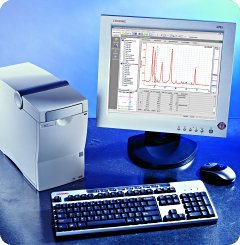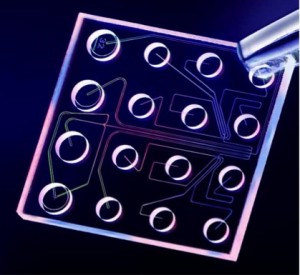The Agilent Bioanalyzer uses a micro-capillary based electrophoretic cell that allows rapid and sensitive investigation of nucleic acid samples. Many sample typ es can be analyzed on the Bioanalyzer, including total RNA, labeled RNA, small and micro RNAs, as well as small and large DNA fragments. The assays provide precise information on the fragment size distributions, however we do not recommended Bioanalyzer assays for accurate quantification.
es can be analyzed on the Bioanalyzer, including total RNA, labeled RNA, small and micro RNAs, as well as small and large DNA fragments. The assays provide precise information on the fragment size distributions, however we do not recommended Bioanalyzer assays for accurate quantification.
The following kits are kept in stock by the Core:
RNA chips – good for measuring RNA integrity, assessing labeled RNA or fragmented RNA size distribution, or polyA+ purification efficacy
RNA Pico Kit: 0.5-2 ng/ul sensitivity. Up to 11 samples/chip.
RNA 6000 Nano Kit: 25-500 ng/ul sensitivity. Up to 12 samples/chip.
small-RNA Assay Kit: 1-100 ng/ul sensitivity (total RNA). Up to 11 samples/chip.
DNA 12000 Kit: 25-50 ng/ul sensitivity, size range 100-12000 bp. Up to 12 samples/chip.
DNA High Sensitivity Kit: 0.5-4 ng/ul sensitivity, 50-7000 bp size range. Up to 11 samples/chip.
For information on other kits that are available to purchase, please consult the Agilent Bioanalyzer site. You are welcome to use any of these products on our instrument following appropriate training. Assay specs can be found on our sample requirements page.
Please note that samples for the Bioanalyzer have to be detergent-free. PCR-buffers and some enzyme buffers may contain detergents; such samples have to purified before submission.
Using the Bioanalyzer
 Users may drop off samples to be run on the Bioanalyzer (see the DNA Quantification/Library QC page) or become trained users. Use of the Bioanalyzer conforms to the standard guidelines for equipment use in the Core (for information visit the Training and Use of Core Facility Equipment page). Additionally, you and your Lab/PI must have a Genome Center PPMS account to use the instrument, which you can create here if necessary.
Users may drop off samples to be run on the Bioanalyzer (see the DNA Quantification/Library QC page) or become trained users. Use of the Bioanalyzer conforms to the standard guidelines for equipment use in the Core (for information visit the Training and Use of Core Facility Equipment page). Additionally, you and your Lab/PI must have a Genome Center PPMS account to use the instrument, which you can create here if necessary.
If you have already completed a formal training with facility personnel, please use the on-line calendar to reserve a 1 hour time slot during normal working hours. Please bring your own pipettes (0.5-10 ul volumes are used), tips, gloves, and ice bucket (we can provide ice). For RNA chips, we recommend bringing your samples over as 2 uL aliquots in 0.5 mL tubes for the denaturing step. Condensed instruction sheets summarizing the protocol for the DNA HS and RNA Nano kits are available and should be consulted before starting your run; among other things this document will further explain what you need to bring and what we provide.
Bioanalyzer Output
The software that runs the Bioanalyzer has a number of useful analytic options. It is available on the computer that runs the instrument, but because the Bioanalyzer is in fairly constant use it is usually not feasible to do much analysis there. We have another copy of the software on a Core workstation, which you’re free to use if available. A demo version of the software is available from Agilent; you can do everything the normal software does except save or export your file. Typically we create a pdf of the file once it is fully analyzed, then put this on our web server for you to download locally.
Bioanalyzer Training
To arrange a training please place a training request through PPMS. If you and your Lab/PI doesn’t already have a PPMS Genome Center account you will need to create one in order to use the equipment. Just go to our login site and follow the instructions for ‘user account creation request’.
The Bioanalyzer training takes about 1.5 hours. Only one person will be trained at a time to fully experience the hands-on training. If other lab members require training they will need to request an official training and pay the per person training fee ($74). We highly recommend bringing your own samples to the training to generate useful data.
As of 2019, a $20 instrument use fee will be charged for each Bioanalyzer run. In most cases users will work with reagents and chips supplied by the Core ($57 for the DNA High Sensitivity and small-RNA assays, and $37 for RNA Pico, RNA Nano, and DNA 12000 assays). Alternatively you are welcome to bring your own reagents.

